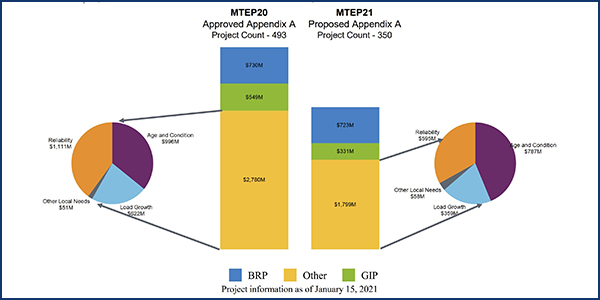The cost of MISO’s 2021 Transmission Expansion Plan is set to ring in substantially below last year’s spending level, the RTO revealed during its South subregional planning meeting Tuesday.
Proposed investment for MTEP 21 stands at $2.85 billion for 350 projects, substantially below MTEP 20’s final $4.05 billion spend for 493 projects. The relatively modest numbers do not include any possible projects under the grid operator’s long-range transmission plan, which will rely on MTEP 21 futures. (See MISO Begins Longterm Tx Modeling.)
Broken down, the draft MTEP 21 contains $723 million worth of baseline reliability projects, $331 million in generator interconnection projects and nearly $1.8 billion spend in the “other” project category, which includes other reliability projects, load growth projects, age and condition-based projects and projects driven by other local needs.
“All of this is preliminary. More information and details will be coming up,” Senior Manager of Expansion Planning Edin Habibovic said.
MISO will finish power flow modeling for MTEP 21 in late spring. After collecting transmission owners’ planning criteria last year, the RTO is now conducting assessments of proposed reliability projects to ensure they’re the most cost-effective solutions. It will also study member-submitted alternatives to project proposals, an effort expected to continue until May.
Making a Case for Long-term Transmission
RTO executives appeared before state regulators to bolster justification for its long-range transmission plan. The first such projects could be approved under MTEP 21.
“Roughly 85% of the footprint has some kind of clean energy goal,” Executive Director of System Planning Aubrey Johnson told state regulators during an Organization of MISO States teleconference on Monday. “This is not going to be achievable without some kind of transmission.”
Clean energy pledges from MISO states and utilities are accumulating quickly. Minnesota this week accelerated its 100% carbon-free electricity pledge by a decade, to 2040. However, the state’s two largest utilities, Xcel Energy and Minnesota Power, are still targeting 100% carbon-free goals by 2050.
MISO expects renewables to account for 25% of its capacity by 2039.
“The question becomes do you have sufficient arteries to deliver this power,” Johnson said.
Americans for a Clean Energy Grid this week compiled studies concluding that grid capacity should double or triple in the near future to reliably accommodate an evolving resource mix.
Johnson said MISO will consider lessons learned from its last long-term planning effort, the 2011 Multi-Value Project portfolio, in which projects were analyzed for benefits as a bundle, not individually. MISO has said projects resulting from its newest long-term plan will be assessed on an individual basis, though there is a chance that some complementary projects could be paired up and considered as one.
“It’s not lost on us the regulatory challenges of a portfolio of projects — some that didn’t get regulatory approval until 2019,” Johnson said, referring to the $492 million Cardinal-Hickory Creek line from southwest Wisconsin to Iowa, the last of the 17-project Multi-Value portfolio in line for a groundbreaking ceremony.
During a subregional planning teleconference on Jan. 27, Clean Grid Alliance’s Natalie McIntire said she’s interested in how MISO will avoid “corridor fatigue” with the long-term package, where the general public tires of dealing with new routes and construction.




